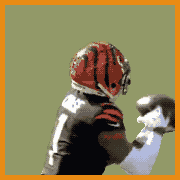|
I'm breaking my radio silence to establish a new rules thread. It's always good to have a place to hash out the arcana of American Football rules. They are complicated, and picky, and all of them exist they way they do for very specific reasons. Most complaints about bad referees are actually good referees correctly enforcing the rules that fans don't understand as well as they think they do. Trin Tragula used to run these, and I noticed we haven't had one for a few years. He's an actual ref with much better answers than I will have. Anybody else who's an actual ref is more than welcome to post either answers to questions or brain teasers for the rest of us to figure out to help us better understand them. I'm into the history of football, and may include some insights into why certain rules exist in the first place. We can discuss college, NFL, and high school rules here. They tend to have slight differences that are easy to confuse. Ref Stripes is a good web site with real refs discussing real situations they've encountered, corrections on calls they may have blown and general insight into the refereeing community. I was inspired to start this by the controversial incomplete call in the OSU-Clemson game. I thought I would try to explain the origins of the catch rules and how it's structured, and then explain why the particular play was called the way it was. First of all the basic idea of a catch still derives from 1906 when the forward pass was first added to the game. The rules were deliberately strict, as the prevailing philosophy was to have no cheap fumbles. Anything that didn't rate as a full clean catch was going to be ruled incomplete, because they didn't want a flurry cheap turnovers to diminish the strategic parts of the game. So here's basic philosophy of a catch: A catch has two parts. The receiver must first possess the ball in his hands, or some other part of his body, then establish control of the ball to complete the catch. Upon fully meeting the requirements, the status of the player changes from being a receiver to being a runner and the pass is deemed completed. Possession generally means having a firm grasp on the ball with one or both hands, while control then means further action with the ball to tuck it away and turn into a runner. Once the receiver is fully acting like a running back with the ball, the catch has been completed. Anything less than that is incomplete. So there are two stages to catching a football. Possession first, and then control. Possession matters for three reasons. One, you can't establish control without first having possession, Two you get forward progress on a catch based on where you gain possession, not where you establish control. For example, a wide receiver leaps to catch a high pass and gets drilled by a DB back toward the line of scrimmage while he's in the air. Where he lands may be several yards back of where he first touched it. Assuming he established control and completed the catch, the ball will be marked where he first gained possession. The third situation is in a boundary play. Possession of the ball and at least one foot inbounds must be established first. If the receiver then falls out of bounds, the ball will again be spotted at the place he first gained possession, not where he's lying when he subsequently demonstrates control. Establishing control has two separate sub-definitions. If a receiver stays on his feet after the catch, that's a different situation with different criteria than if he catches the ball doing to the ground. In the first, he establishes control by becoming a runner. Possession means the ball is in his hands, to become a runner he needs to tuck the ball safely into his body and then do something a runner would do, like make a juke step, or give a stiffarm, or something like that. It's a "I know it when I see it" sort of thing, but that's about as precise as it gets. Subclause 2 is for when a runner catches the ball and goes to the ground. Since he's not turning into a runner, there are different ways of determining if he has established control. Demonstrating control as you're going to the ground means getting the ball tucked away before hitting the ground, so that the ground doesn't aid in controlling it. The ball can touch the ground, now, but it has to be only incidental. If you catch the ball falling and have it loose in your hands, then land on the ball so that the ground helps you to keep it in your hands, it's incomplete - it's not a demonstration of control, you trapped it. Likewise, losing control of the ball after hitting the ground is also not a demonstration of control. It doesn't matter how many steps you took, it doesn't matter that you had a foot inbounds, if you can't hang onto it after hitting the ground you did not establish control and the pass is incomplete. In the case of the Clemson pass: it was in the receiver's hands so he had established possession. He remained on his feet, so the runner rules apply. However, it remained in his outstretched hands as he took several steps and the defender knocked it away before he could get it tucked into his body and begin performing as a runner. Thus the receiver had possession but could not establish control so it was an incompleted pass. The biggest mistake people make in looking at passes and their completions is keeping straight those two necessary components. People see possession, and think that's a catch. Or they forget that going to the ground has different rules than if you stay on your feet. Establishing control is the complicated part and usually the reason questionable plays are ruled incomplete. The "football move" part isn't relevant if you're falling down, and catching the ball off-balance and falling down after taking a couple of stumbling steps is still falling down, with those rules applying to it. There was a big controversy in a Michigan game a few years ago, where a guy caught a pass on a crossing route, took several steps while losing his balance and ultimately fell down, losing the ball when he hit the ground. People went berserk because he had taken two or three steps with the ball tucked under his arm "Football move!", but it ended up incomplete because he fell down before he completed the catch and lost the ball. If he had regained his balance and turned up field he would have been fine. "Going to the ground" includes being off-balance when you catch the ball and the consequences of that. So when you're analyzing a catch, remember to look at all the components. Did the guy have possession with a least one foot inbounds, and did he then do what was necessary to demonstrate control and complete the catch? Most questionable situations will be ruled incomplete, because avoiding cheap fumbles is part of the intent. Completing the process of the catch is deliberately hard. If anyone has questions or wish for further clarification, fire away. If there's anything I've got wrong that needs correcting, have at it with that, too. Figuring out edge cases and intricate sub-clauses can lead to fascinating journeys. I haven't buried my nose in a rulebook for a couple years, so I need an excuse to get sharper again.
|
|
|
|

|
| # ? May 2, 2024 10:09 |
|
Did Dez catch it?
|
|
|
|
Hi, he caught the football then got it knocked loose so any rules lawyering that makes that not true is dumb and should be ignored. Thanks for the words though
|
|
|
|
you broke my grill posted:Did Dez catch it? No. Possession is not sufficient for a catch. He had possession, but did not demonstrate control so he did not complete the catch.
|
|
|
|
Football rules! Discussion?
|
|
|
|
Welcome back Det
|
|
|
|
Dez didn't, megatron did. As someone who doesn't watch a ton of college the targetting rules intrigue me. How would college fans say they're implemented? Do they seem like they're called consistantly and have they been a deterrent?
|
|
|
|

|
| # ? May 2, 2024 10:09 |
|
football rules
|
|
|









